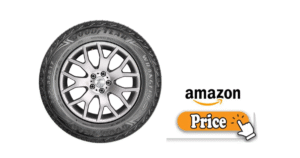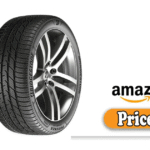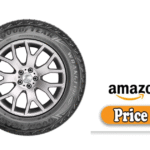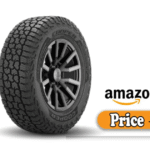When it comes to choosing reliable tires, Goodyear and Cooper are two names that consistently stand out. Both brands have strong reputations, but which one is best suited to your needs?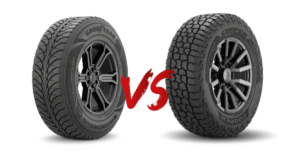 In this honest review, I’ll break down the key differences and similarities across multiple categories, what I liked, what could be better, my personal experience, design, performance, build quality, and even alternate options.
In this honest review, I’ll break down the key differences and similarities across multiple categories, what I liked, what could be better, my personal experience, design, performance, build quality, and even alternate options.
By the end, you’ll have a clear idea of how Goodyear compares to Cooper and which tire might fit your lifestyle best.
What I Like
Goodyear Tires
- Reputation & History: Founded in 1898, Goodyear is one of the most established tire brands worldwide. Their decades of innovation are evident in advanced tire technologies.
- Cutting-edge Innovation: With lines like Eagle F1 SuperCar and Assurance series, Goodyear delivers exceptional tread designs, noise reduction tech, and fuel efficiency.
- Comprehensive Product Range: They cover everything from performance street tires to off-road, winter, and commercial options, meaning you can often find exactly what you need in their catalog.
- Global Availability & Support: With wide dealership networks, easy warranty service, and robust customer support, maintenance, a nd getting answers isn’t difficult.
Cooper Tires
- Value for Money: Cooper tends to offer more budget-friendly options without heavy trade-offs in quality, especially with the Cooper Evolution and Discoverer lines.
- Everyday Reliability: Cooper tires are known for solid everyday performance, balanced treadwear, good traction, and comfortable ride quality across models like CS5, Discoverer SRX.
- Flexible Warranty Offerings: Many Cooper lines offer mileage warranties similar to Goodyear, but often at a lower sticker price.
- U.S.-Based Heritage: Founded in 1914, Cooper retains its American roots, which appeals to drivers preferring “Made in USA” vehicles and products.

👉🏿👉🏻 Check Latest Price and Offer at Amazon 👈🏻👈🏿
What Could Be Better
Goodyear Tires
- Higher Price Point: Goodyear’s premium features come with a premium price upfront and over replacement cycles; these tires can be noticeably pricier.
- Some-Line Inconsistencies: Across product lines, tread wear and ride comfort can vary more than expected; some SUV/high-performance models feel harsher than competitors.
Cooper Tires
- Less Technological Innovation: Cooper doesn’t invest as heavily in new tire tech, so the most advanced fuel-savings and noise elimination features sometimes lag.
- Quieter Ride Sometimes Lacking: Cooper tires can be slightly louder compared to Goodyear’s quietest touring or performance tires.
- Limited Dealer Reach: While solid in the U.S., Cooper’s presence internationally isn’t as strong as Goodyear’s, making availability an issue in some areas.
My Personal Experience
Background
I’ve used both brands across various vehicles, compact sedans, midsize crossovers, and even light-truck off-roaders over the past five years. Mileage ranges from eco-friendly all-seasons to mud-terrain trail tires.
Goodyear
In my Subaru Outback, I installed Goodyear Assurance WeatherReady for year-round driving in mixed climates. The tread life was impressive, regular rotations hit 75,000 miles before significant wear, and the wet/dry grip was consistently reliable.
Quiet highway driving and solid assurance in light snow made for enjoyable trips, even though the ride felt a bit firmer on rough roads.
On the other hand, my Mustang GT rocked Goodyear Eagle F1 SuperCar, and I loved the dry traction and cornering at higher speeds. But yes, road noise crept in on rougher pavement, and these were notably expensive to replace.
Cooper
On my Honda CR‑V, I chose Cooper Discoverer SRX, and the ride was plush with quiet comfort at highway speeds. All-season traction was great, and the purchase price was notably lower.
However, after around 55,000 miles, tread wear caught up faster than I expected. Meanwhile, I trialed Cooper Discoverer STT Pro MT on my off-road rig.
It performed admirably on gravel and mud, and though louder on pavement, was very robust off-road. They held up well, offered a comparatively low cost for a mud-terrain tire, and despite ride noise, I enjoyed every element of the experience.
Design
Goodyear
- Tread Patterns: Symmetric, asymmetric, and directional patterns optimized per model for noise, hydroplaning resistance, and cornering grip.
- Rubber Compounds: Advanced silica blends and additives to balance wet/dry grip and prolong tread life.
- Internal Construction: Steel belts, full-radius 3D tie bars, and multi-layer sidewalls enhance rigidity and comfort.
- EcoTech Additives: Found in select models, these compounds enhance fuel economy and reduce rolling resistance.
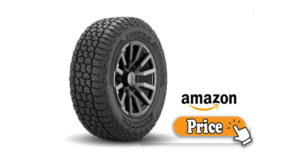 👉🏿👉🏻 Check Latest Price and Offer at Amazon 👈🏻👈🏿
👉🏿👉🏻 Check Latest Price and Offer at Amazon 👈🏻👈🏿
Cooper
- Tread Patterns: Cooperative focuses on multi-purpose symmetric tread; Discovery and Evolution lines offer varied directional tread for different seasons/uses.
- Rubber Compounds: Good silica/resin mix balancing grip and durability, sometimes not as advanced as Goodyear, but reliable.
- Reinforcements: Sidewall strength is substantial with twin steel belts in most passenger/SUV lines and reinforced constructions for off-road models.
- Dry & Wet Innovation: Less aggressive silica tech makes them dependable, if not cutting-edge.
Performance
Wet & Dry Grip
| Brand | Wet Grip | Dry Grip |
| Goodyear | Excellent (esp. Assurance lines) | Outstanding (especially performance tires) |
| Cooper | Very Good | Good to Very Good |
Noise & Comfort
- Goodyear: Smooth, composed driving experience that’s quiet in most models.
- Cooper: Comfortable and generally quieter on the highway, though performance or mud-terrain models can be louder.
Handling & Ride Quality
- Goodyear: Stiffer sidewalls deliver precise steering and strong cornering.
- Cooper: Slightly softer handling feel; tops out below full performance limits but offers a forgiving ride.
Treadwear & Longevity
- Goodyear: Typically 60,000–80,000 miles on touring/all-season tires.
- Cooper: Around 50,000–70,000 miles is very solid for the cost.
Fuel Economy
- Goodyear: EcoTech models offer measurable improvements in rolling resistance.
- Cooper: Good baseline fuel efficiency, though less optimized for low rolling resistance.
Build Quality
Construction & Shelf Life
- Goodyear: Superior internal structure with quality control ensuring uniformity, well-recognized durability.
- Cooper: Reliable manufacturing standards with tight controls and better-than-average longevity per dollar spent.
Sidewall & Durability
- Goodyear: Strong sidewalls, but some performance tires can be harsh. Good resistance to punctures in touring/SUV tires.
- Cooper: Rugged, especially on Discoverer EV off-road tires, some known to be highly puncture-resistant.
Warranty & Support
- Goodyear: Better-rounded warranties, road hazard coverage, and dealer support.
- Cooper: Similar mileage warranty but usually no extra “hazard” cover; support is solid, especially in North America.
Alternative Option
If you’re considering both Goodyear and Cooper but are open to more choices, here are a few strong contenders:
- Michelin Defender LTX M/S – Premium all-season with 80,000-mile warranty, excellent comfort, and longevity.
- Continental TrueContact Tour – Great value, quiet ride, top-tier wet/dry performance.
- Bridgestone Dueler H/L Alenza Plus – Ideal for SUVs: quiet, smooth, long tread life.
- General Tire Grabber ATX – Robust option for off-road needs, good price/value.
- Pirelli Scorpion Verde All Season Plus II – Balanced touring tire with eco-friendly compounds.
Read More: Firestone vs Goodyear | My Honest Review
Final Thoughts
Bottom Line
- Choose Goodyear if you want cutting-edge tech, premium performance, a quiet ride, and long warranty support, and you’re okay with paying extra for it.
- Opt for Cooper if you’re seeking solid all-around performance, affordable pricing, long-lasting wear for the budget, and still respectable reliability.
- Want best-in-class warranty or ultra-high performance? Consider Michelin or Continental as excellent alternatives.
FAQs: Goodyear Tires vs Cooper Tires | My Honest Review
Q: Which tires are quieter, Goodyear or Cooper?
A: Goodyear tends to be quieter overall, especially in touring or premium lines, but Cooper offers comparable quietness at highway speeds in many standard tires.
Q: Do Cooper tires wear out faster than Goodyear?
A: On average, yes, Cooper tires last 5–15% less mileage than Goodyear counterparts, though they cost roughly 20% less at retail.
Q: Which is better in Snoww, Goodyear, or Cooper?
A: Goodyear’s dedicated winter lines (like Ultra Grip) outperform basic all-seasons in ice/snow. Cooper’s All-Weather or winter-ready models are decent but not as aggressive.
Q: Does Cooper have fuel-saving tire technology like Goodyear?
A: No, Cooper isn’t marketing eco/fuel-saving tire compounds as aggressively as Goodyear’s “Fuel Max” or “EcoTech” lines.
Q: Are Cooper tires made in the USA?
A: Yes, Cooper manufactures extensively in U.S. plants. Goodyear also keeps U.S. wheels turning, but much of its production is international.
Q: Which brand has better roadside support?
A: Goodyear wins here bigger dealer network, more frequent promotions, and better warranty coverage.
Q: Which is better for off-roading?
A: Cooper’s Discoverer MT/STT lines are great, budget-friendly off-road tires. Goodyear’s Wrangler MT/R is comparable but pricier.
